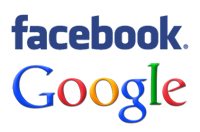When Pigs Fly: Why Facebook And Google Are Becoming Ad Partners
You may have raised your eyebrows at last week’s announcement from Google that it is partnering with Facebook to offer its clients access to Facebook Exchange (FBX) inventory through DoubleClick Bid Manager. Two competing online ad giants entering into a partnership? Why would Facebook finally want to open up to Google, and why would Google […]
 You may have raised your eyebrows at last week’s announcement from Google that it is partnering with Facebook to offer its clients access to Facebook Exchange (FBX) inventory through DoubleClick Bid Manager. Two competing online ad giants entering into a partnership? Why would Facebook finally want to open up to Google, and why would Google want to sell Facebook inventory?
You may have raised your eyebrows at last week’s announcement from Google that it is partnering with Facebook to offer its clients access to Facebook Exchange (FBX) inventory through DoubleClick Bid Manager. Two competing online ad giants entering into a partnership? Why would Facebook finally want to open up to Google, and why would Google want to sell Facebook inventory?
After all, Google took over the top spot in digital display revenue from Facebook last year, according to eMarketer. That same study estimates Google’s display ad revenue share will continue to grow at a solid clip from 17.6 percent in 013 to 24.6 percent in 2015, while Facebook’s share will remain relatively flat growing from 15.5 percent in 2013 to 16.2 percent in 2015.
Here are a few reasons why the partnership, now, makes sense and why both stand to gain.
1. Ad traders reliant on DoubleClick Ad Manager want easy access to FBX inventory. Buying FBX inventory becomes increasingly — and needlessly in their minds — complex for the many large agency trading desks using DoubleClick Bid Manager. Facebook wants their ad dollars, and opening up the marketplace to DBM bidders potentially means higher CPCs.
2. FBX offers arguably the most successful retargeting platform on the web. Ads can be shown in the right rail of user’s timelines, but more importantly, Facebook began allowing marketers to retarget users with ads in the news feed in March 2013. By most accounts, marketers have found great success in FBX for converting customers in a brand-safe, controlled environment. Google wants to satisfy the inventory demands of their DBM clients, and the addition of FBX allows Google to provide a one-stop-shop experience. Plus, Google gets a cut of FBX ad spend it’s been losing out on.
3. Facebook has established a network of DSP partners — it initially opened FBX with 16 DSP partners — which means it isn’t reliant on Google for supporting its inventory and revenue stream from FBX. In so doing, Facebook essentially created its own DSP ecosystem that has proven sustainable without Google support. That said, Google may have a late start to the race, but it still stands to gain some businesses back from those smaller DSPs.
Time, of course, will tell which giant benefits the most from this arrangement. (In the immediate future, the clear winners are DBM-reliant agency traders.) One glaring shortcoming with FBX is that the ads aren’t offered on mobile. It must be assumed Facebook is making progress in this area and that mobile FBX is a given. When that happens, FBX will again have the potential to upend the RTB landscape, and Google will be there to benefit.
Contributing authors are invited to create content for MarTech and are chosen for their expertise and contribution to the search community. Our contributors work under the oversight of the editorial staff and contributions are checked for quality and relevance to our readers. MarTech is owned by Semrush. Contributor was not asked to make any direct or indirect mentions of Semrush. The opinions they express are their own.
Related stories